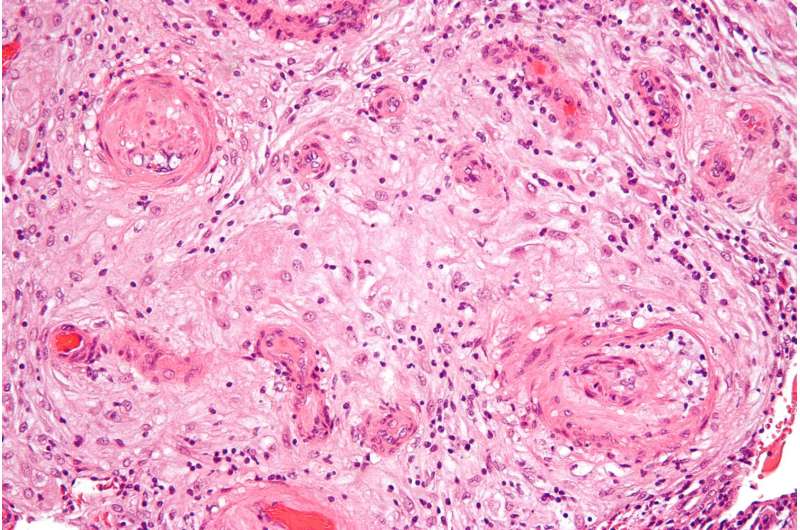
Women with severe preeclampsia (severe high blood pressure) during pregnancy may be treated with extended-release nifedipine, a blood pressure-lowering medicine, daily during the labor and delivery process, according to new research published today in Hypertension, an American Heart Association journal. Women treated with the medicine were less likely to experience dangerously high blood pressure that would require treatment with fast-acting medicines including intravenous (IV) medications.
The study examined whether treatment with nifedipine, an extended-release blood pressure-lowering medication, leading up to labor and delivery may prevent severe blood pressure levels from developing, and, as a result, avoid the need to administer fast-acting IV medications.
According to the American Heart Association, preeclampsia is typically diagnosed after 20 weeks of pregnancy and indicates high blood pressure measures with symptoms such as headaches, vision changes and swelling of the hands, feet, face or eyes. A diagnosis of preeclampsia with severe features typically includes systolic blood pressure (the top number in a blood pressure measurement) of 160 mm Hg or higher and/or diastolic blood pressure (the lower number in a blood pressure measurement) of 110 mm Hg or higher, and high protein levels in the urine. It affects up to 8% of pregnancies and increases the risk of stroke, liver or kidney damage and pre-term delivery (delivery before 40 weeks). Delivery of the baby is the only way to start to cure preeclampsia, and symptoms usually go away within days of delivery. However, some women continue to need blood pressure medication for six weeks after delivery or longer.
“We know that bringing down very high blood pressure to a safer range will help prevent maternal and fetal complications. However, besides rapid-acting, IV medicines for severe hypertension during pregnancy, optimal management for hypertension during the labor and delivery process, has not been studied,” said lead study author Erin M. Cleary, M.D., who was a fellow in maternal fetal medicine at The Ohio State University in Columbus, Ohio, when the study was conducted.
Severe high blood pressure also raises the risk for complications such as placental abruption, where the placenta, which supplies the baby developing in the uterus with nutrients and oxygen from the mother, detaches from the uterus before the baby is born. This may lead to serious complications for mother and/or the baby.
“Some of these complications may include emergency delivery, blood loss for the mother and may be life threatening for both the mother and baby,” Cleary said. “About 10% of patients treated with a rapid-IV treatment for very high blood pressure may quickly have very low blood pressures. When blood pressure gets too low, too fast, that can lead to other serious complications.”
The study was conducted from June 2020 to April 2022 at The Ohio State University Wexner Medical Center in Columbus and included 110 women who were at least 22 weeks pregnant, diagnosed with severe preeclampsia and who underwent induction of labor. Half of the participants were randomly assigned to take one 30 mg pill of nifedipine extended-release each day until delivery, the other half of participants were randomly assigned to take a placebo pill daily until delivery. Neither the study investigators, clinical care team, nor the women knew if they were assigned to take nifedipine or the placebo. Participants were followed through hospital discharge, and chart review was performed through 6 weeks postpartum to monitor for any postpartum readmissions along with reasons for readmission.
The researchers also examined the impact of nifedipine treatment on delivery, if and how long the baby may have needed care in the neonatal intensive care unit (NICU) and other adverse outcomes for the mother and/or baby.
The study found:
- 34% of women in the nifedipine group needed acute hypertension therapy (immediate reduction in blood pressure) compared to 55.1% of those in the placebo group.
- There were fewer Cesarean deliveries among the women treated with nifedipine: 20.8% of women in the nifedipine treatment group had a Cesarean section, compared to 34.7% of women in the placebo group.
- The rate of NICU admission for the newborns was lower if the mother was treated with nifedipine (29.1%) compared to the placebo group (47.1%).
- Poor outcomes for the infant –such as lower Apgar score, low blood sugar levels, high bilirubin or needing extra oxygen—did not differ significantly between the two treatment groups.
It’s important to note, however, that the number of participants in this study was too small to determine whether the differences in the NICU and Cesarean rates may hold true or if they may be due to chance or other factors. The researchers plan to conduct larger studies with more participants to better understand if these differences are valid.
A March 2021 American Heart Association scientific statement, Adverse Pregnancy Outcomes and Cardiovascular Disease Risk: Unique Opportunities for Cardiovascular Disease Prevention in Women, details pregnancy-related complications that increase a woman’s risk for developing cardiovascular disease after delivery: high blood pressure, gestational diabetes, preterm delivery, small-for-gestational-age delivery, preeclampsia, pregnancy loss or placental abruption. The statement urges vigorous primary prevention of cardiovascular disease (CVD), prevention of CVD risk factors during pregnancy and follow-up to monitor CVD risk throughout life.
Co-authors are Nicholas W. Racchi, D.O.; K. Grace Patton, M.D.; Meghana Kudrimoti, B.S.; Maged M. Costantine, M.D.; and Kara M. Rood, M.D. Authors’ disclosures are listed in the manuscript.
Trial of Intrapartum Extended-Release Nifedipine to Prevent Severe Hypertension Among Pregnant Individuals With Preeclampsia With Severe Features, Hypertension (2022). DOI: 10.1161/HYPERTENSIONAHA.122.19751
Citation:
Severe preeclampsia treated safely with nifedipine during labor and delivery (2022, October 3)
retrieved 3 October 2022
from https://medicalxpress.com/news/2022-10-severe-preeclampsia-safely-nifedipine-labor.html
This document is subject to copyright. Apart from any fair dealing for the purpose of private study or research, no
part may be reproduced without the written permission. The content is provided for information purposes only.


